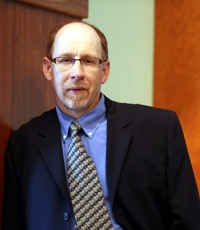About Christopher Marchand
My work with troubled teens began in Chatham, Ontario, Canada when I was asked by a Probation officer to tell the story of my journey through drug addiction and the prison system, to a class of high school teens. As often happens, the one-time event turned into four years of travelling with a team on a regular basis to prisons, juvenile detention centers, and schools. Rather than see my life as a wasted mess, I was surprised to discover that my story had a positive impact on those who heard it.
I soon found myself in college (a bizarre idea put upon me by a few friends), looking for a way to understand life’s meaning, addiction, and the Christian faith. Although it had not been my intention, I managed to end up in a church working in the role of clergy caring for teens. Of course, I naturally gravitated to kids and families with crisis and addiction related issues. A student I teach recently put it rather succinctly, she said, “You really gravitate to the bad ass.” It’s as true today as it ever was, I guess that’s the way I discovered compassion fatigue.
I came upon the idea of compassion fatigue from the inside, not knowing what was happening to me. Unrecognized, what could have been managed and resolved grew into burnout and eventually into full-blown depression. I simply was not emotionally equipped to face the kinds of painful stories and situations that I experienced in my work on a fairly regular basis. It was not until years later, during my doctoral studies that a professor would teach a class detailing the kinds of things that can happen to caregivers when they hear trauma stories. It was an amazing moment for me. In that class, so much began to make sense. Over the next two years, I read everything I could find on the topic and I began to interview clergy who specialized in work with teenagers. I wrote my doctoral dissertation on the topic of compassion fatigue and the Canadian adolescent worker. In my research thus far (using the Compassion Satisfaction/Fatigue Self-test) of more than 400 Canadian youth workers, my results show 40% scoring dangerously high. Although I approach the topic as an educator and not as a therapist, I bring to my seminars my own personal encounter with compassion fatigue working in combination with over 400 interviews with youth workers, three years of conversations with caregivers attending my seminars, training from the Traumatology Institute and extensive academic research.
Much of my research has focused primarily on Christian caregivers and I have discovered in this specific group a rather unique toxic combination of poor boundaries and unhealthy self-care, typically motivated by duty-bound religious conviction and poor theological reflection. My background and research contexts provide me with a rich opportunity to address the issue of compassion fatigue with the Christian care giving community, something that is not currently being done on a broad scale. In addition, with www.christophermarchand.ca and the publishing of Restoring Rebecca, my goal is to begin carrying this message to a broader audience, including social workers, those in palliative care, and other care giving communities serving in public, non-religious environments
Education
| 2008 - Present | Bachelor of Social Work University of Manitoba |
| 2007 | Doctor of Ministry (D. Min.) Providence Theological Seminary, Otterburne, MB Thesis: “An Investigation of the Influence of Compassion Fatigue Due to Secondary Traumatic Stress on the Canadian Youth Worker” |
| 2000 | Master of Divinity (M. Div.) North American Baptist Seminary (Sioux Falls Seminary), Sioux Falls, SD |
Occupation
| 2000 - Present | Associate Professor of Youth Leadership Providence College and Seminary |
Certifications
- Certified Compassion Fatigue Specialist, Traumatology Institute (Canada)
- Applied Suicide Intervention Skills Training (ASIST)
- Ordained (1992), Congregational Christian Churches in Canada

Dr. Christopher Marchand
Certified Compassion Fatigue Specialist
